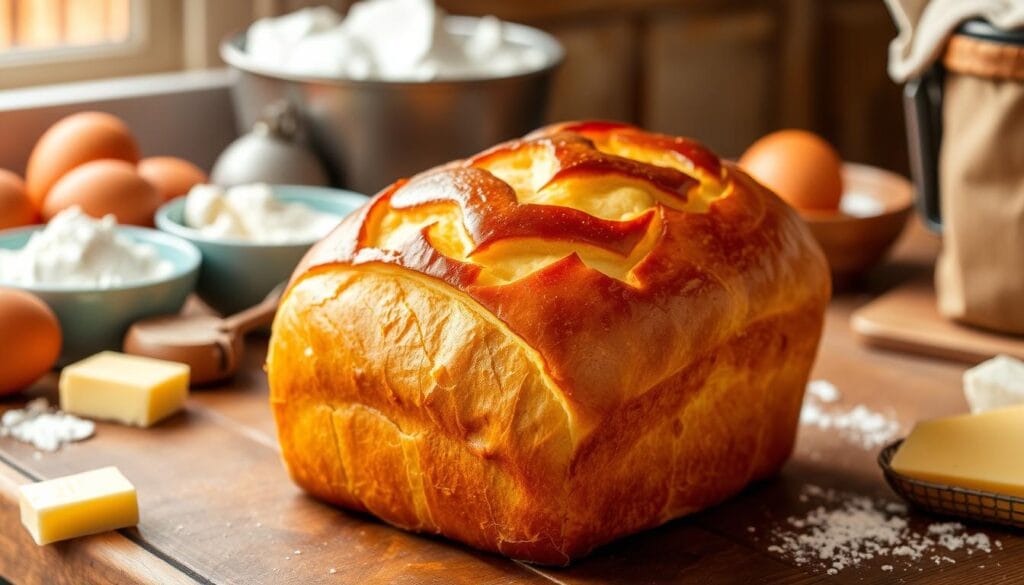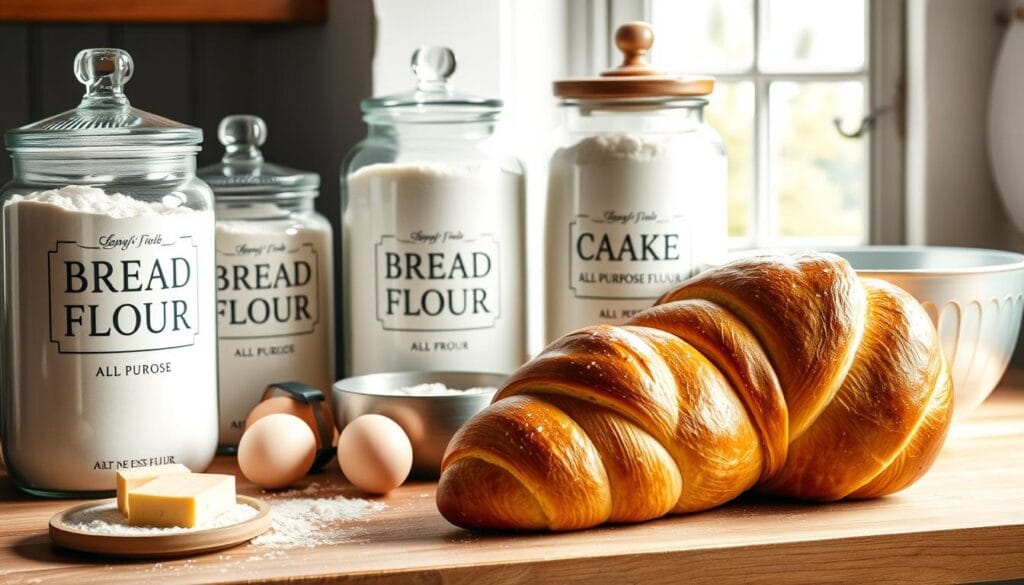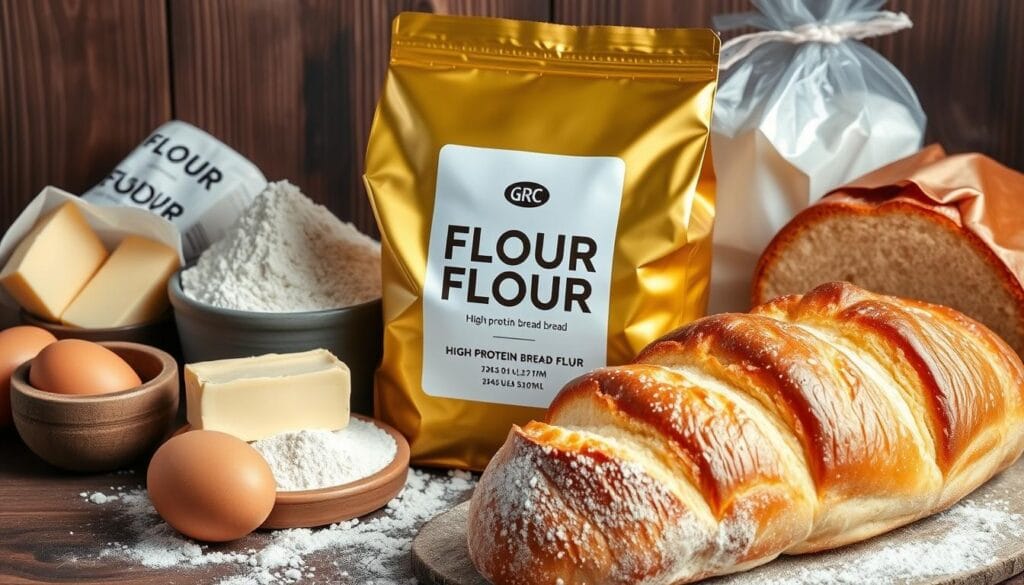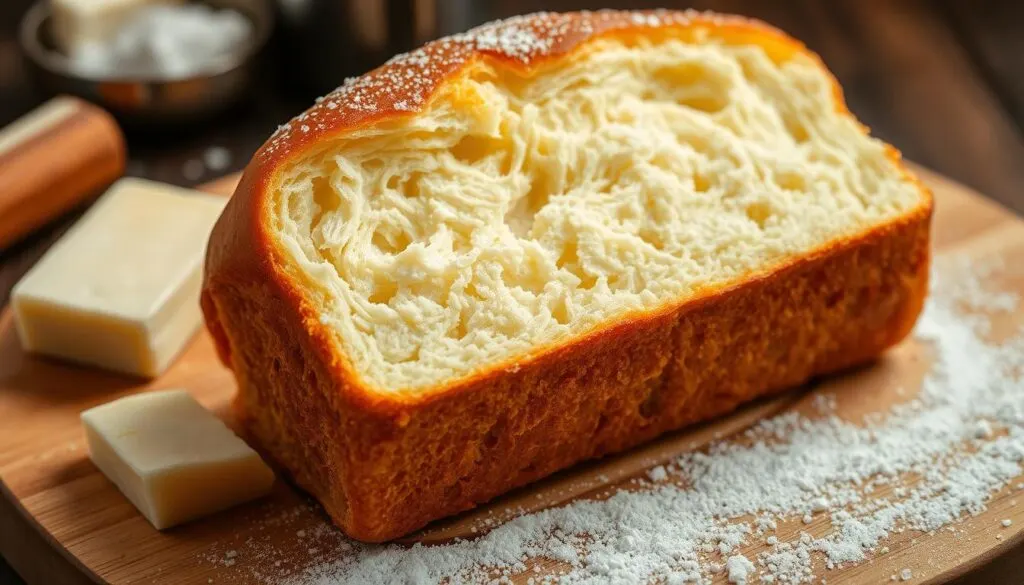Brioche is a rich French bread loved for its buttery taste and softness. It’s enjoyed in many ways, like brioche buns and French toast. If you’re looking for the best flour for brioche, you’re in the right spot. This guide will help you pick the right flour for amazing brioche every time.
For a brioche recipe, you’ll need 4 to 4.5 cups of all-purpose flour. You’ll also need butter, eggs, and yeast. The dough rises for 1 to 2 hours, depending on the temperature.
This recipe makes about 12 brioche rolls. They bake in 20-25 minutes at 350°F. Each roll has 264 calories, with 39g of carbs and 7g of protein. It’s a tasty treat you’ll love.
Table of contents
- Understanding Brioche: The Enriched Dough
- What Makes Brioche So Special?
- Choosing the Right Flour for Your Brioche
- What is the best flour for brioche?
- The Importance of Protein Content in Flour
- Comparing All-Purpose Flour and Bread Flour
- Specialty Flours for Gourmet Brioche
- Blending Flours for Optimal Results
- Hydration and Its Effects on Brioche Dough
- Common Mistakes Made When Baking Brioche
- Tips for Perfecting Your Brioche Recipe
- FAQ
- Conclusion
Understanding Brioche: The Enriched Dough
Brioche is known for its rich, tender texture. It has a lot of butter and eggs. This makes it special. It comes from France and is loved for special times and everyday treats.
Definition of Brioche
Brioche is a dough with lots of fat and eggs. It’s made with flour, sugar, yeast, and salt. These ingredients make it soft and slightly sweet.
This mix of flavors and textures makes brioche popular for many dishes.
The Role of Ingredients
Each ingredient in brioche has its own role. Fresh butter and eggs give it a rich taste. A good brioche recipe has 60% flour, 20% butter, and 10% each for eggs and liquid.
Knowing how these ingredients work together helps us understand brioche’s luxurious texture.

What Makes Brioche So Special?
Brioche is special because of its unique ingredients. The addition of butter and eggs makes it taste and feel amazing. These elements are what make brioche stand out.
Butter and Eggs in Brioche
Butter is a key ingredient in brioche. It makes the dough moist and rich. You’ll need about ½ cup of unsalted butter, softened.
Eggs add richness and stability to the dough. They also give the crust a beautiful golden color. This mix of ingredients helps the dough rise beautifully.
Texture and Flavor Characteristics
The high fat and protein from eggs make brioche soft and airy. It has a lightly sweet flavor. This makes it great for both sweet and savory dishes.
When you eat brioche, it melts in your mouth. This unique texture sets it apart from other breads.
Choosing the Right Flour for Your Brioche
When you start baking brioche, picking the right flour is key. The flour you choose affects the taste, texture, and how much it rises. Making a good choice can make your brioche delicious.
The Impact of Flour on Brioche
The best flour for brioche has a lot of protein. This helps make gluten, which is important for a soft crumb. Using the right flour makes sure fats and sugars work well in the dough. If you use all-purpose flour, your brioche might not be as light as you want.
Types of Flour to Consider
There are several flours you can use for brioche:
- Bread Flour: With about 12-14% protein, bread flour is best for brioche. It helps make the dough light and fluffy.
- All-Purpose Flour: All-purpose flour is good for many things, but it might make your brioche denser. Mixing it with vital wheat gluten can help.
- T45 Flour: This special flour is fine and ferments well, making it perfect for fancy brioche.

Each flour type has its own role in making your brioche. Knowing about them helps you pick the best one for your baking.
| Type of Flour | Protein Content | Best Use |
|---|---|---|
| Bread Flour | 12-14% | Ideal for fluffy and airy brioche |
| All-Purpose Flour | 10-12% | Can be used with added vital wheat gluten |
| T45 Flour | 8-10% | Great for gourmet brioche |
What is the best flour for brioche?
Choosing the right flour is key for a great brioche. It needs to support the dough’s rich ingredients. Bread flour is the top pick because it has a lot of protein. This helps create a strong gluten structure.
High-Protein Flour Recommendations
Look for a flour with 12-14% protein for the best brioche. Here’s a quick guide:
| Flour Type | Protein Content | Notes |
|---|---|---|
| Bread Flour | 12-14% | Best choice for structure and rise. |
| All-Purpose Flour | 10-12% | Can be used but may yield a denser brioche. |
| European-Style Flour | 11-13% | Provides excellent flavor and texture. |
Alternative Flour Options
Want to try something different for brioche? Consider unique flours like T45 or specialty blends. They can add special flavors. Just remember, you might need to tweak the baking time. Trying new flours can make your brioche even more special.

The Importance of Protein Content in Flour
Knowing how protein in flour affects brioche is key. The right protein helps create gluten, which is vital for the bread’s structure and texture. For brioche, using high protein flour, like bread flour, is best. It gives the dough the strength needed to hold rich ingredients like butter and eggs.
Understanding Gluten Development
Gluten in brioche comes from the flour’s protein. This protein forms a network that traps gases during fermentation. A strong gluten is necessary for brioche’s enriched dough. Without enough protein, the dough may be too weak, leading to a dense texture.
Choosing flour with more protein ensures a light and fluffy crumb. This is because higher protein content means better gluten formation.
How Protein Affects Brioche Texture
The protein in flour greatly impacts brioche’s texture. More protein means better gluten, making the dough stronger and more elastic. This allows the dough to handle fats and sugars well, creating a tender yet structured texture.
The creamy moisture from butter and milk adds to the bread’s luxurious feel. So, picking the right flour with the right protein content is essential for that perfect brioche texture.
Comparing All-Purpose Flour and Bread Flour
Choosing the right flour for brioche is key. Knowing the difference between all-purpose flour and bread flour is important. Each flour type has its own benefits that can change your brioche’s texture and how it rises. Here, we’ll look at bread flour’s advantages and when to use all-purpose flour.
Benefits of Using Bread Flour
Bread flour is popular among bakers because it has more protein, about 12-14%. This extra protein means more gluten when you knead. This is great for brioche and other doughs.
- It helps your dough rise better.
- It makes your brioche fluffier and airier.
- It adds chewiness, perfect for hearty doughs.
So, bread flour is the best choice for making brioche.
When to Use All-Purpose Flour
All-purpose flour is versatile but has less protein than bread flour. It has 10-12% protein, which might not be enough for rich doughs. Use all-purpose flour when:
- You’re making lighter pastries or cakes.
- For quick breads or muffins where texture isn’t as important.
- When you don’t have bread flour available.
In short, all-purpose flour is okay in some cases, but it’s not as good as bread flour for brioche. Knowing when to use each flour will help you bake better.
| Flour Type | Protein Content | Best Use | Effects on Brioche |
|---|---|---|---|
| All-Purpose Flour | 10-12% | Lighter pastries, cakes | Lesser structure, denser texture |
| Bread Flour | 12-14% | Bread, brioche, chewy textures | Better rise, fluffier, chewier |
Specialty Flours for Gourmet Brioche
Choosing the right flours is key to perfect brioche. Specialty flours like T45 add special qualities. T45 flour has a fine texture and just the right amount of protein. This makes the dough tender and rich.
T45 Flour and its Uses
T45 flour is a favorite in French pastry kitchens. It’s light and has low protein, creating a soft crumb. Use it for classic brioche or creative baked goods. Your brioche will be soft and airy.
Exploring Enriched Flours
Enriched flours can bring new flavors to brioche. They often include milk, eggs, or fat. This makes the dough moist and tender. Try different enriched flours to find new tastes in your brioche.
Blending Flours for Optimal Results
Blending flours for brioche lets you get the perfect texture and taste. Mixing different flours creates a dough that’s both light and rich. This is key to making traditional brioche.
Combining Different Types of Flour
Using a mix of flours can really improve your brioche. Try mixing bread flour for strength with a bit of cake flour for softness. This mix gives you a light texture and keeps the dough’s structure.
Playing with these ratios can lead to a truly amazing brioche. It’s all about finding the right balance.
Creating a Custom Flour Mix
Making a custom flour mix for brioche lets you tailor your baking. For example, adding whole wheat flour gives a nuttier taste and more nutrients. You can adjust the mix to keep the brioche’s classic taste.
Whether you’re following dietary needs or just want to try new flavors, a custom flour blend is key. It ensures your brioche turns out just right.
Hydration and Its Effects on Brioche Dough
Understanding hydration in brioche dough is key for the right texture and rise. Water does more than mix; it wakes up yeast and dissolves flour proteins. This helps create gluten, making the dough soft and able to rise well.
The Role of Water in Your Dough
Water is not just for mixing; it shapes the dough’s character. In brioche, it’s essential for gluten formation, thanks to fats and sugars. The right amount of water affects kneading and rising. A dough with enough water ferments better, leading to richer flavor and texture.
Adjusting Hydration Levels for Different Flours
Changing hydration levels depends on the flour type in your brioche. High-protein flours need more water. For instance, bread flour might need extra liquid for good hydration.
If your dough looks too dry or doesn’t stretch well, add water slowly. Start with a tablespoon at a time. On the other hand, if it’s too wet, add flour in small amounts.
| Condition of Dough | Action Needed |
|---|---|
| Too Dry (looks like oatmeal) | Add water, 1 tablespoon at a time |
| Too Wet (resembles cake batter) | Add flour, 1 tablespoon at a time |
Common Mistakes Made When Baking Brioche
Baking brioche can be a fun experience, but mistakes can ruin it. Using old or low-quality flour is a big problem. It makes the loaf dense instead of light and airy. Also, not mixing the dough right can make things worse.
Using Old or Low-Quality Flour
The type of flour you use is very important for brioche. Old or low-quality flour doesn’t give the right structure or taste. This can make your brioche dense and not as good as it should be.
Always choose fresh, high-quality flour. It has the right amount of protein for great baking results.
Neglecting Proper Mixing Techniques
Mixing the dough right is key for brioche. If you don’t mix enough, the dough won’t be elastic. This can make your loaf fall flat.
Make sure to mix all the ingredients well. A well-mixed dough will support itself during rising and baking. This leads to a light and airy brioche.
Tips for Perfecting Your Brioche Recipe
To make a delicious brioche, focus on a few key things. These tips will help your brioche stand out at any event.
Using the Right Yeast
Choosing the right yeast for brioche is vital. Active dry or instant yeast works well. Make sure it’s fresh for a good rise.
Yeast needs to be alive to make your dough rise well. Keep it in the fridge to keep it fresh.
Temperature Control and Its Importance
Keeping the right temperature for brioche is key. The dough should be between 75°F and 78°F. This helps the yeast work best, making the brioche taste and feel great.
If it’s cold, use a proofing box or warm water. This helps get the dough to the right temperature.
| Aspect | Recommendation |
|---|---|
| Yeast Type | Active dry or instant yeast |
| Ideal Dough Temperature | 75°F – 78°F |
| Freshness Check | Ensure yeast is within its expiry |
| Storage for Yeast | Refrigerate for longer shelf life |
| Proofing Tips | Use a proofing box if necessary |
FAQ
Bread flour is the top choice for brioche. It has 12-14% protein. This helps the dough stay light and airy.
Bread flour is also great for fluffy bread. Its high protein helps create a soft, well-structured loaf.
Reddit fans often pick bread flour for brioche. They say it has the right gluten strength. Some also suggest T45 flour for a traditional French brioche.
Brioche’s sweetness comes from sugar and its rich ingredients. Butter and eggs add to its sweet taste.
Here’s a simple recipe. Mix bread flour, sugar, yeast, eggs, butter, and salt. Knead until smooth. Let it rise, then shape into buns and bake until golden.
Yes, there are easy brioche recipes. They need just a few ingredients and simple steps. The classic brioche loaf is a popular choice for breakfast and baking.
Bread flour is the best, but all-purpose flour works in a pinch. Specialty flours like T45 and enriched flours can also improve your brioche’s taste and texture.
Flour’s protein content affects gluten development. This is key for brioche. It helps the dough hold its rich ingredients without falling apart.
Avoid using old or low-quality flour. Don’t skip proper mixing to develop gluten. Also, watch your proofing and baking times to avoid dense or uneven brioche.
Conclusion
Mastering brioche means knowing its dough, choosing the right flour, and avoiding mistakes. Now, you have the knowledge to make perfect brioche at home. The fermentation process adds flavor, while butter and eggs make it soft and delicious.
When baking, knead for 10–12 minutes to get that smooth dough. If dough is sticky, use a little flour, not too much. Bake at 375°F (190°C) for small brioche and 350°F (175°C) for big ones. Make sure they’re 190°F (88°C) inside for the best taste.
Success in brioche baking takes patience and practice. Let your dough rise well and follow the tips in this guide. With time, you’ll enjoy making brioche for any meal, making every bite special.

